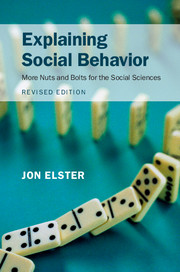Book contents
- Frontmatter
- Dedication
- Contents
- Preface
- I Explanation and Mechanisms
- II The Mind
- III Action
- 10 Constraints: opportunities and abilities
- 11 Reinforcement and selection
- 12 Persons and situations
- 13 Rational choice
- 14 Rationality and behavior
- 15 Responding to irrationality
- 16 Implications for textual interpretation
- IV Interaction
- Conclusion: is social science possible?
- Index
12 - Persons and situations
from III - Action
Published online by Cambridge University Press: 05 August 2015
- Frontmatter
- Dedication
- Contents
- Preface
- I Explanation and Mechanisms
- II The Mind
- III Action
- 10 Constraints: opportunities and abilities
- 11 Reinforcement and selection
- 12 Persons and situations
- 13 Rational choice
- 14 Rationality and behavior
- 15 Responding to irrationality
- 16 Implications for textual interpretation
- IV Interaction
- Conclusion: is social science possible?
- Index
Summary
Shame and guilt, or contempt and anger, differ in that the first emotion in each pair targets a person's character and the second some action by the person (Chapter 8). Similarly, pridefulness rests on the belief that one is a superior person, and pride on the belief that one has performed some outstanding deed. But when we blame or praise an action, is it not because we believe it reflects the agent's character? To what other factor could it be ascribed?
When folk psychology goes wrong
This book is mostly not about praise or blame, but about the explanation of behavior. In this context, the question is the power of character to explain action. People are often assumed to have personality traits (introvert, timid, etc.) as well as virtues (honesty, courage, etc.) or vices (the seven deadly sins, etc.). In folk psychology, these features are assumed to be stable over time and across situations. Proverbs in all languages testify to this assumption. “Who tells one lie will tell a hundred.” “Who lies also steals.” “Who steals an egg will steal an ox.” “Who keeps faith in small matters, does so in large ones.” “Who is caught red-handed once will always be distrusted.”1 If folk psychology is right, predicting and explaining behavior should be easy. A single action will reveal the underlying trait or disposition and allow us to predict behavior on an indefinite number of other occasions when the disposition could manifest itself. The procedure is not tautological, as it would be if we took cheating on an exam as evidence of dishonesty and then used the trait of dishonesty to explain the cheating. Instead, it amounts to using cheating on an exam as evidence for a trait (dishonesty) that will also cause the person to be unfaithful to a spouse. If one accepts the more extreme folk theory that all virtues go together, the cheating might also be used to predict cowardice in battle or excessive drinking.
People often make strong inferences from the austere private conduct of others. The British politician George Lansbury had a favorable impression of Hitler, based on the fact that “he has no love of show or pomp, is a total abstainer, non-smoker, vegetarian, and lives in the country rather than in a town. He is a bachelor, and likes children and old people.”
- Type
- Chapter
- Information
- Explaining Social BehaviorMore Nuts and Bolts for the Social Sciences, pp. 223 - 234Publisher: Cambridge University PressPrint publication year: 2015



